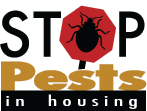- HOME
- » IPM TRAINING
- » Training Opportunities
- » StopPests Webinars
- » Managing Pests in Multifamily Housing
Managing Pests in Multifamily Housing
Program Information
This webinar ran live on April 26, 2012.
This video is a re-recording of the presentation.
Presenters: Allison Taisey (Project Coordinator at the Northeastern IPM Center) and Sandra Harrison (Property Manager at the Housing Authority of the City of York)
Summary: This presentation is for anyone interested in beginning an integrated pest management (IPM) program at a multifamily property. Property owners/managers and staff from organizations that work with multifamily properties are encouraged to view it. Viewers will gain an understanding of IPM and learn the resources available to support their efforts.
Presentation Recording
 |
 |
Questions and Answers
From the April 26, 2012 webinar. If you have further questions, e-mail us.
Question: How did Sandra make the meeting to discuss IPM with the resident mandatory—is it on the lease?
Sandra’s response: Yes, we put the following language in the lease and got the change approved by our board. Listed below are the examples of language that has been board approved. It is used to assist residents with complying with our requests during IPM implementation. When they receive a housekeeping violation, they can have it removed by participating in IPM. Many residents are/were appreciative of the ability to have the lease violation removed and gladly participate. On the back end, repeated lease violation (3, or more) was/is cause for lease termination.
- Regulations. To abide by such necessary and reasonable regulations as may be promulgated by the Authority for the benefit and well-being of the housing development and the tenants. Such regulations shall be posted in the Project Office and are incorporated by reference in this Lease. Violation of such regulations constitutes a violation of this Lease.
- Pest Control and Repairs—Cooperation. To cooperate fully with the Authority staff and its contractors in any pest control efforts, modernization, repairs, etc. For example, abusive or threatening words or conduct are violations of this provision. The Authority may accompany any pest control personnel in order to assure that the Tenant is cooperating fully with pest control efforts. Tenant is not permitted to refuse extermination service, and the Tenant is responsible for cleaning the area(s) to be worked on.
- Condition of Premises. To keep the dwelling unit and Authority equipment in such condition as to prevent health or sanitation problems from arising; to dispose of all ashes, garbage, rubbish, and other waste from the premises in a sanitary and safe manner; to keep the premises within the boundaries of the Tenant’s assigned unit in a clean, neat and safe condition; this includes snow removal on the sidewalks from the front and back door leading to the main sidewalks and the main sidewalk in front and/or rear of the unit and includes mowing the grass.
Question: You mention some work on sample policies and procedures and/or IPM Plans. Would you or one of your clients have a sample IPM plan, policies or procedures that they would be willing to share?
Allie’s Response: If anyone reading this question has a plan they would like to share, please send it to stoppests@cornell.edu. We may integrate your information into our next site update!
Information on lease and policy language is at: http://www.stoppests.org/what-is-ipm/using-ipm/#policy and http://www.bphc.org/hpfhi/Pages/home.aspx
A detailed description of an IPM Plan is within our Sample RFP. Note that no two IPM Plans will be alike due to site-specific pest pressures, staffing, and resident needs.
